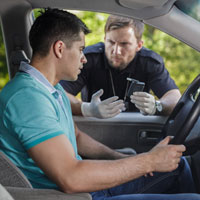 Field sobriety tests are commonly used by police to determine if a person is driving while intoxicated (DWI). There are three standardized sobriety tests. Each one is designed to measure a specific reflex that is believed to be compromised if a person has been drinking:
Field sobriety tests are commonly used by police to determine if a person is driving while intoxicated (DWI). There are three standardized sobriety tests. Each one is designed to measure a specific reflex that is believed to be compromised if a person has been drinking:
- Horizontal gaze nystagmus test: Measures increased involuntary jerking of the eyes
- One-leg stand: Tests for balance and ability to follow directions
- Walk-and-turn test: Checks for coordination while following directions
Although these tests are endorsed by the National Highway Traffic Safety Administration (NHTSA), they are not always an accurate measure of intoxication. Additionally, inaccuracies can occur if the test is administered incorrectly or scored improperly. If you face a DWI conviction, protect your rights by contacting a knowledgeable DWI attorney.
Field Sobriety Tests versus Breathalyzer Tests
Many people have a common misperception that breathalyzer testing is part of field sobriety testing. The two tests are different and different laws apply. The driver of a vehicle can politely refuse an officer’s request to take a field sobriety test. In fact, some attorneys recommend that a driver decline an officer’s request for a field sobriety test because the results can be used as evidence in court. However, for those that have honored the request and failed the test, all is not lost. A Cherry Hill DWI lawyer can review the footage taken from the patrol car’s dashboard camera to check for discrepancies.
However, those suspected of a DWI who are requested to take a breathalyzer test must comply. Refusal to take a breathalyzer test will most likely result in an automatic license suspension for seven months. The penalties for each subsequent breathalyzer refusal grow even more severe. Refusing a breathalyzer serves little purpose and the defense will most likely argue that the reluctance to comply is an admission of guilt.
DUI/DWI
Although certain states differentiate between the two, in New Jersey, driving under the influence (DUI) and driving while intoxicated (DWI) mean the same thing. A conviction for a DUI/DWI has serious consequences. This is especially true if:
- DUI resulted in an accident
- DUI resulted in injury to people or damages to property
- Person convicted of a DUI was driving without a license
- Incident occurred in a school zone
- Second or subsequent DWI
- Person has a blood alcohol content of 0.10 or greater
Cherry Hill DWI Lawyers at Gigliotti Law Group Aggressively Represent Those Facing DUI/DWI Charges
If you have been arrested on a DUI/DWI charge in New Jersey, you may be facing jail time, long-term license suspension, insurances surcharges, and mandatory installation of an ignition interlocking device on your vehicle. Do not leave your future in the hands of a novice. Receive the dedicated, knowledgeable representation you need today from a Cherry Hill DWI lawyer at Gigliotti Law Group.
For a free consultation, contact us online today or call us at 844-742-7591. From our office in Cherry Hill, New Jersey, we proudly represent clients throughout Camden County, Burlington County, Gloucester County, and Mercer County.

